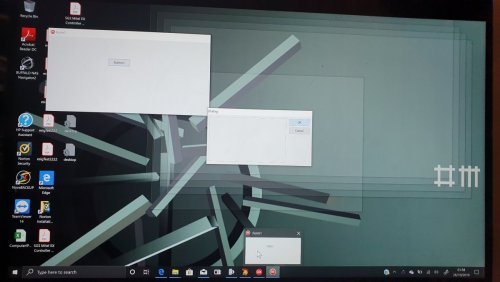

McScotty
-
Content Count
19 -
Joined
-
Last visited
Posts posted by McScotty
-
-
My question was that I thought setting PopUpParent was the same (more or less) as setting WndParent in the CreateParams.
Clearly that is not the case but I really want to know why setting WndParent corrects a bug in the taskbar thumbnail that a standard Delphi application suffers from ordinarily if the dialog is not destroyed.
-
Yes sure. Example 1 is the one with the issue on the taskbar, run the code and click on button then OK dialog. hover mouse over taskbar and then the thumbnail image and you will see the closed (hidden) dialog is now visible, but will disappear again if you click on the thumbnail.
Example 2 is the same code, but the dialog has been modified to override the create process by adding Params.WndParent:=application.Handle; Run the code as above and voila, no dialog is shown in the taskbar.
-
My understanding of the PopUpParent is that I can use it or I can use CreateParams and set the WndParent myself which results as the same thing.
If I set the PopUpParent to the main form it appears correctly, but still suffers from the showing the dialog in the thumbnail preview.
However if I use CreateParams and set
Params.WndParent:=application.Mainform.Handle;
This does not suffer from the issue with the thumbnails. Why is it behaving differently?
-
Maybe I am not making myself clear.
In the properties of the dialog, I set PopUpParent := Form1, is that that what I am supposed to do? Not the main form.
Regardless, doing this does not solve the issue that I have discovered,. The code I put in CreateParams does however.
-
Hi David.
I did try setting popupparent to the main form, but that makes no difference either, but to be fair, it is a property that I have ignored, and actually thought it had to do with popup menu's until I looked into it.
What I was referring to was that on each dialog window, if the creating is overriden by adding a CreateParams as follows, that seems to fix the issue, but I am unsure why, or if this is a safe way to get round the issue.
procedure TOKRightDlg.CreateParams(var Params: TCreateParams);
begin
inherited;
Params.WndParent:=application.Handle;
end;I appreciate that closing down the dialog is a valid way to get round the problem, and if Embarcadero will not fix this in Widows 10, I am happy to live with a work-around. I can largely do this by freeing the dialog, but on some, I would prefer not to have to do it, as I never had to do it before on Windows 7. I am happy to put the above in the get round the issue if I can't or dont want to free the dialog, providing it is safe to do so.
I would even settle for an option to turn of the live thumbnail preview of just my app, is that an option at all?
-
I have tried various application.mainform.handle and just application.handle To be fair I am a bit mixed up as it works differently in 10.3 than it does in 2007, not sure what way around it is, but either way, it certainly looks like it works.
I would just like to know by doing so, it fixed the issue and is not likely to cause anything else to go wrong.
Thanks.
-
Yeah that is entirely possible but I have only heard of it with Delphi apps. It might be there is a simple solution that can be invoked such as forcing the thumbnail to redraw, I am not aware how to do that but I would be interested in if its possible, and if it will be another work-around.
-
I have reported this to Embarcadero and I see that other people have reported similar issues back on 2008 and as yet still no fix or further information.
Hopefully someone can comment on my possible solution and say if they think it is safe to do what I proposed as a possible work-around rather than having to release the dialog.
Thanks everyone for your comments so far.
-
Thanks for your advice, as I said I agree that releasing the dialog will do the trick and I am able to do this easily on some of the dialogs, others I would prefer I could populate once and then re-use so I would have liked it if there was a solution. Perhaps it is the one I have already suggested myself, I just want to know that I am not doing something stupid that will cause issues later on.
I wish the they had fixed this bug in 10.3 though, its not very good that this issue persists now that W10 has been around for a few years.
-
Well I agree destroying the dialog does indeed solve the problem, but it does not resolve the issue that has surfaced with Windows 10. I still stand by populating the combobox once for any instance of an application is better because you only need to populate once, not every time, regardless of where you get the data from. To me that seems like unnecessary processing.
-
10 minutes ago, David Heffernan said:Not so. Populating a combo takes no discernible time. Try measuring it.
It depends where the data comes from, connecting to a DB will take a bit of time and it depends on how much data you are getting in the first place. Also if you want a dialog to remember your last selection this is easy to do by simply not releasing the dialog. Also it avoids unnecessary processing, if you can do it once, that should be the best way to do it, rather than multiple times
Anyway, this thread is about a bug that appears to be in Delphi since at least D2007 up to current version that is only exposed in Windows 10 and if/what are the possible solutions/work-arounds that can be achieved without having to release the dialog.
-
7 hours ago, Uwe Raabe said:You can create the instance on first use and then reuse it when needed.
Indeed that is what I have been doing, by not releasing the dialog, and just re-using. However by doing so, this bug surfaces in Windows 10, hence the original question.
-
5 hours ago, David Heffernan said:What is the downside of creating the form when you need it and destroying it when it is closed?
The downside is simply speed. If you have to fill a combobox with names for instance, doing this only once per application session is advantageous rather than destroying and having to fill the combo boxes again and again...
So this appears to be a specific bug in Delphi regarding Windows 10 and no know official fix other than closing the dialog so it can't be used again unless re-created. If this is the official response, then it means there is little point in ever using the oncreate event in a dialog, which to be fair, I thought was the whole purpose of doing something only once, not every time you show the dialog.
I have to say I am a bit disappointed that this is the case in 10.3 Rio. I can however understand why it happens in D2007 as it predates Windows 10.
-
The reason I use the OnCreate in some forms is to fill comboboxes with names from a database for example. I only want to do this once per invocation of the form so I just re-use the existing form rather than destroy it and having to go through the same process again every time I want to show the dialog. Is there a better way to do this that I am not aware of?
-
I can get the above code to work without issue as well, but the only reason it appears to be working is due to the release at the end.
If you want to create a dialog just once within the application so do not release it, you still have the same problem. I normally create the dialogs on demand when I need them, but do not release them so that I can run code once in the creating of the dialog which could be slow in some areas, keeping the dialog after creatinon speeds up the app.
So this issue still exists. Any other ideas?
I have found that if I override the creation of the dialog as follows....
protected
procedure CreateParams(var Params: TCreateParams); override; (under public declarations)then the below in the implementation section of the dialog...
procedure TOKRightDlg.CreateParams(var Params: TCreateParams);
begin
inherited;
Params.WndParent:=application.Handle;
end;That this code appears to make the dialog work.
but if you modify the code to be Params.WndParent:=application.MainForm.Handle; it stops working again.
It would appear to be some issue regarding Delphi and the MainFormHandle in 10.3 Rio. Interestingly, in D2007 using the same code on Win 10 avoids the problem like in 10.3 Rio, but changing the parms to application.maiform.handle or just application.handle works either way, they both result in the same value.
Anyone have some idea what is going on?
-
-
That is interesting.
Here is my code if you care to look at it.
Open up application and then click on the button. Close down the dialog box then put hover mouse over taskbar icon, then move mouse into thumbnail image. It is only the latter part that things look wrong.
-
I have come across an issue with Delphi and Windows 10. I have an old app done in Delphi 2007 and although the application appears to work fine in Windows 10, if you create a modal dialog from your main form and then close down, the dialod but not main form, then hover your mouse over the task preview, you see the main form, but you also see the dialog windows as well even though it was already closed. Clicking on the preview brings the window to be the fore, and the dialog disappears again. Other than that, there does not appear to be any issue, it just looks very unprofessional, especially if you have a lot of dialogs within an app. To see this you have to hover over the taskbar icon, this works fine, but then move your mouse into the thumbnail windows. It is only at this point you see the dialog you previously had open, along with other rectangular windows outlines.
I did not have the MainFormOnTaskbar := true set (My app was originally ported from D2006) but I have set it before the creation of the main form in the .dpr file and it has absolutely no impact at all. However if I move this line to be run immediately after the main form creation, it looks like it works. I read online that this line must be run before the main form, so looking for some advise please.
This issue seems to persist across different Delphi versions, and I am also seeing it in 10.3 Rio. I can understand D2007 as it pre-dates Win10 but how come this get through QC testing in 10.3 Rio and has not largely been reported elsewhere.
I found another work-around. If I put Params.WndParent:=application.Handle; into the dialog, this seems to fix this issue in D2007 at least. Is this safe to use in this mannor, not sure why it works as the handle is the same handle it would have if I had never put this code in, but it does seem to work.
Would appreciate some advise from anyone who can help.
Thanks
David.
![Delphi-PRAXiS [en]](https://en.delphipraxis.net/uploads/monthly_2018_12/logo.png.be76d93fcd709295cb24de51900e5888.png)

Delphi 2007 to 10.3 and Windows 10 taskbar issue
in VCL
Posted
OK thanks for your time on this.